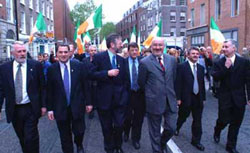 |
Irisch
Republikanische Solidarität
|
 |
UNIONIST 'NO' MEN STILL WANT MORE
* Sinn Fein opposes new monitoring body
Unionist hardliners have called for still more concessions
following today's announcement by the British and irish
governments of a new international body to monitor ceasefires
and other aspects of the peace process.
And Sinn Fein will not co-operate with the Independent
Monitoring Commission, party president Mr Gerry Adams told the
Irish Prime Minister, Taoiseach Bertie Ahern.
The IMC is being set up at the request of David Trimble's
Ulster Unionist Party who sought a mechanism to impose harsh
measures against Sinn Fein over allegations of continuing IRA
activity.
The four-member panel will assess paramilitary ceasefires and
other aspects of the 1998 Good Friday Agreement, and make
recommendations for sanctions in case of violations.
The body is primarily intended to boost Trimble's leadership
against his critics within the UUP but it has infuriated
republicans, who see it as a blow to the delicate compromise
of the peace process. Trimble's hardline critics, who make
another stand against him at a party meeting on Saturday,
remain dissatisfied, however.
Speaking after a meeting involving the Taoiseach and the Irish
Minister for Foreign Affairs, Brian Cowen, Mr Adams pointed
out that the commission was outside the terms of the 1998 Good
Friday Agreement and dismissed it as "another attempt to meet
the insatiable demands of elements among unionism".
He insisted Sinn Fein was against the body and would not
co-operate with it.
Describing the Commission as "impractical", he said that it
had been designed to placate Unionists, and had now been
tinkered with and diluted to satisfy factions within Unionism.
Mr Adams, who was accompanied by Sinn Fein chief negotiator Mr
Martin McGuinness, added that the commission conferred powers
on British ministers that they did not previously have and had
not been given by the Agreement. He again insisted that
elections to the Belfast Assembly, twice cancelled by the
British government this year, must go ahead.
CIA ON THE CASE
The commission will be made up of two British Government
nominees, an Irish Government representative and a United
States nominee.
The US representative on the board is Richard Kerr who has
served US intelligence agencies for 32 years, rising to deputy
director of the CIA.
The Irish nominee is Joe Brosnan, who is a former EU
Commissioner for Employment and Social Affairs.
The British nomineess to the body will be Commander John
Grieve, former head of the London anti-terrorist police and
John Alderdice, formerly leader of the Alliance Party and
speaker of the Belfast Assembly.
The draft Agreement published today specified that only the
British nominees would consider matters relating to the
observation of their pledge of office by Ministers of the
northern Executive -- a point of contention for unionist
hardliners earlier this summer.
CHANGES NEEDED - DONALDSON
Nevertheless, the Ulster Unionist Party's Jeffrey Donaldson
was critical of the consitution of the commission and its
remit. He insisted that, despite the appointment of Mr
Alderdice -- generally identified as a moderate unionist --
there was no unionist representative on the board.
He claimed the Dublin government would have a "crucial role"
in the commission's decisions.
"Further changes to the body are going to have to be made if
this body is to be acceptable," Mr Donaldson said.
Fellow hardliner David Burnside insisted the plans they did
not form the "basis for the Ulster Unionist Party to go back
into government with Sinn Fein/IRA."
David Trimble welcomed the announcement and said three of the
members had detailed knowledge of paramilitarism. He said Mr
Alderdice was someone "who could reflect the views of the
community".
He added that Dublin would still have no influence in the
internal affairs of the Six Counties, which he referred to as
the "Strand One boundary line" in reference to the distinction
made in the negotiations leading up to the Good Friday
Agreement.
"Anybody can see what was being described in June as a breach
of a fundamental principle of unionism is addressed," he said.
"The Strand One boundary line has been observed and that has
been done clearly.
"Those who called Saturday's meeting now owe the rest of us a
duty to reflect."
WAIT AND SEE - BLAIR
Meanwhile, at a press conference in London today, British
Prime Minister Tony Blair would not be drawn on the possible
date for the Assembly election.
Mr Blair insisted on the importance of agreement among the
political parties for the restoration of the North's political
institutions before an election could proceed. He hoped the
announcement of the monitoring body would facilitate unionist
agreement.
But he said the process could not continue indefinitely
without elections. He said: "Obviously it is far better we
have those elections against a background of agreement as to
the way forward. We are working hard now and will do in the
next few weeks to achieve that agreement.
"I hope in the next couple of weeks I will able to be a little
more definitive ... I think there is a prospect of getting
agreement. We have come very close but failed the last couple
of times to get agreement."
Letzte Änderung:
06-Sept-03